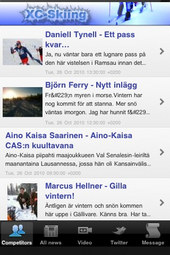Tour de Ski Alpe Cermis 2012: Men GPS analysis

Alexander Legkov (RUS) was the strongest skier on the Alpe Cermis stage in the 2012 edition of Tour de Ski – only 0.1 second ahead of Maurice Manificat (FRA) and with Marcus Hellner (SWE) only a second behind. Curious fact: Both these skiers broke down completely on the second last stage of Tour de Ski 2012 – loosing around 2 minutes!
Updated 8/1/2011 22:30! Article has been updated with GPS-data read out from the units – now better data available.
However, Roland Clara (ITA) won the climb itself (see climb times further below) – with Legkov only in fourth 16 seconds behind. Manificat and Moriggle (ITA) where also faster than Legkov up the final climb.
See also:
- Overall Tour de Ski results 2011/2012 edition – including athlete news
- The big Alpe Cermis Final Climb page – all stage times for all previous Tour editions
GPS illustration
The above GPS split times illustration is taken from the live GPS tracking (complete GPS-tracking available here). Unfortunately Manificat’s GPS did not transsmit data in the first part of the stage, but You can see how Manificat was 20 seconds behind Legkov after 7.4 km – beating Legkov in the last part.
(The article continues below the graph)

Hellner versus Northug
The biggest fight in today’s stage was the fight for second spot – as Dario Cologna (SUI) could “take it easy” at the front of the race. The two main players in the fight for the seconds spot was Marcus Hellner (SWE) and Petter Northug (NOR). Northug started 40 seconds behind Hellner, and lost some small seconds on the first flat part as you can see on the GPS-illustration below. When the hill starts around 6.5 km, Hellner eats the lead of Northug second by second – catching the Norwegian around 7.5 km. Northug manages to hang on for 500 meters, but then at 8 km it is “Good bye” to Northug. Hellner takes nearly 40 seconds on Northug in the end.

Legkov versus Hellner
Now comparing Hellner against Legkov for the stage win – a fight which Hellner looses with just about a second. Hellner takes time on Legkov in the flat part up to 7 km, then Legkov takes time on Hellner in the first part of the alpine hill. Based on the comparison between Hellner and Northug above, it looks like this is where Hellner takes it easy for some minutes to gather some strength to catch Northug. Thus it looks like Hellner looses the stage victory due to his tactical play in order to win the second spot in the overall tour.

Clara versus Legkov
Next up is Roland Clara – the strongest climber today – versus Legkov. As you can see from the below illustration, Clara looses around 30 seconds in the flat part of the course until around 6 km – then continues to loose some time in the steepest part of the hill, but is clearly faster from 7.8 km and up to the finish where he gains more than 20 seconds.

What about Lukas Bauer?
Lukas Bauer (CZE) was the big favourite to win the stage after impressive performance in earlier editions. This was however not Bauer’s big day – loosing a lot of time in the flat part and in the first part of the hill. The first 7.7 km Bauer lost nearly a minute to Legkov. The last part of the hill Bauer was on par with Legkov – but then Legkov had already started loosing to Clara.

Cologna versus Hellner and Northug
Comparing Dario Cologna with Hellner, you see how Hellner is on par with Cologna in the flat part, and then picks a minute up the alpine hill.

Comparing Cologna with Northug, the opposite happens. Northug manages to get some seconds on Cologna in the flat part down to 6 km, but then looses time in the alpine hill in two places: around 7.3 km where Northug waits for Hellner and from 7.5 km where Northug understands that he has lost all possibilities for a 2nd spot and his 3rd spot is secured.

Climb times
Climb times of all skiers are available here.
1. Roland Clara 16.34.9
2. Maurice Manificat 16.48.2
3. Thomas Moriggle 16.49.3
4. Alexander Legkov 16.51.0
5. Matti Heikkinen 16.51.8
6. Sjur Røthe 17.07.9
7. Marcus Hellner 17.10.3
8. Michail Semenov 17.13.8
9. Yevgeniy Velichko 17.18.2
10. Martin Bajcicak 17.18.8
Stage times
Stage times for all skiers available from FIS.
| 1 | LEGKOV Alexander | RUS | 30:38.2 | 0.00 |
| 2 | MANIFICAT Maurice | FRA | 30:38.3 | 0.07 |
| 3 | HELLNER Marcus | SWE | 30:39.9 | 1.11 |
| 4 | CLARA Roland | ITA | 30:54.4 | 10.58 |
| 5 | MORIGGL Thomas | ITA | 31:08.9 | 20.04 |
| 6 | HEIKKINEN Matti | FIN | 31:12.3 | 22.26 |
| 7 | ROETHE Sjur | NOR | 31:30.8 | 34.34 |
| 8 | BAUER Lukas | CZE | 31:31.1 | 34.53 |
| 9 | DI CENTA Giorgio | ITA | 31:35.9 | 37.67 |
| 10 | DYRHAUG Niklas | NOR | 31:37.0 | 38.39 |


